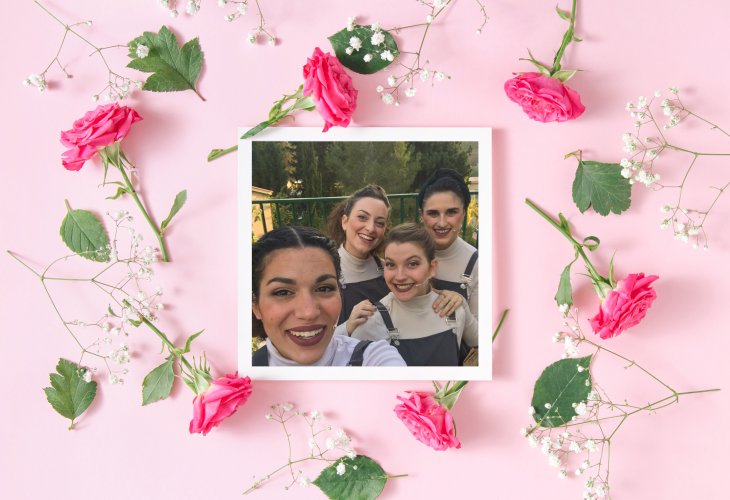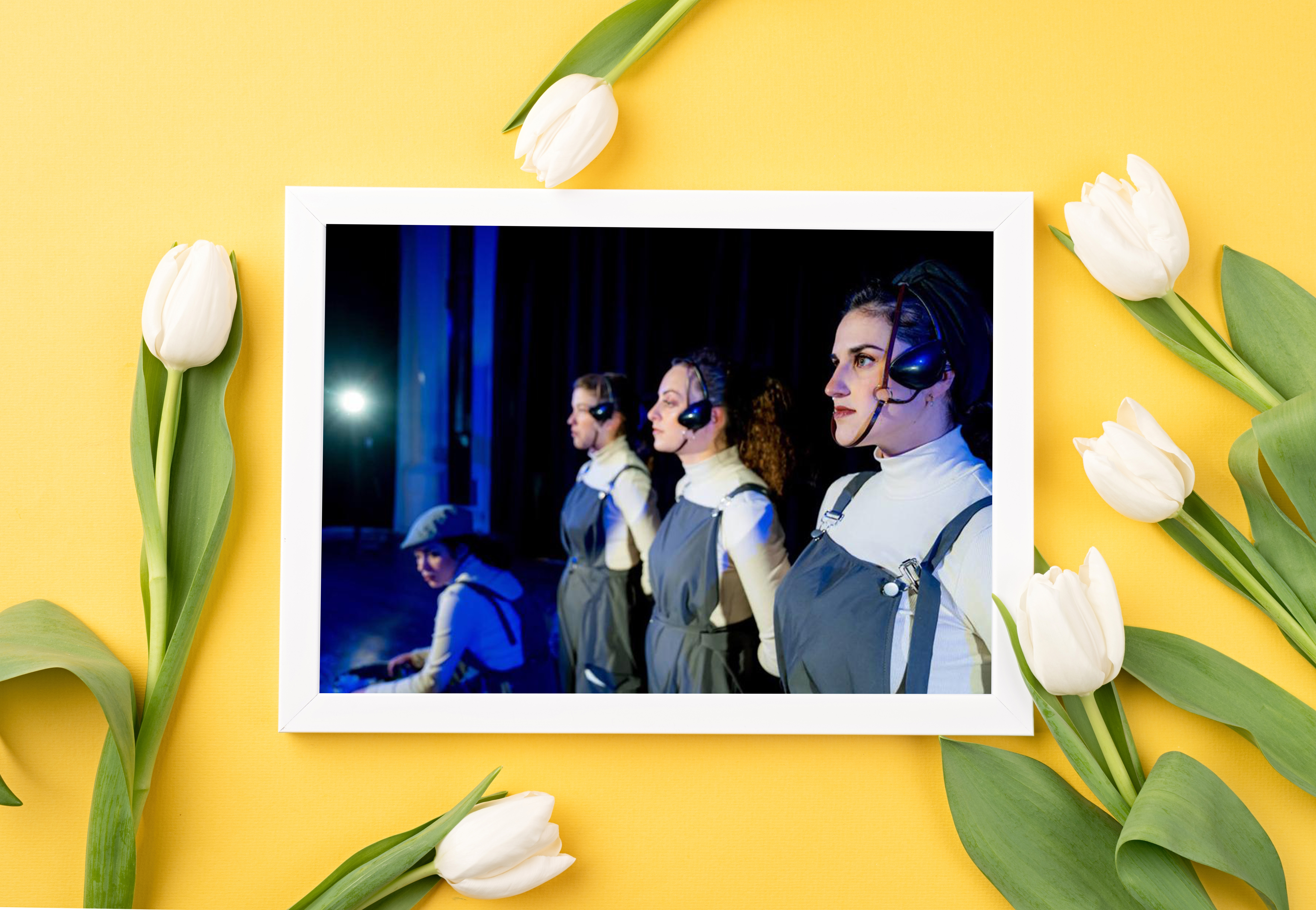"I Saw My Sister Wiping Tears, and I Was Really Choked Up": Religious Actresses Open Their Hearts
Actresses of the play 'What Are We Talking About' perform exclusively in front of women and pay heavy prices for their decision. They share the pain from which they create, the hidden connection between theater and Judaism, and how they link the Book of Job to Chekhov's play.

In recent months, the legal prohibition in Israel concerning gender-segregated cultural events has repeatedly come under public discussion. Many women wishing to perform in front of women only, for various reasons, and even men who want to do so, encounter significant resistance. It turns out, like in many other cases where a positive value—in this case, the value of equality—is used in a non-positive way, a great injustice is created. Nevertheless, following the establishment of the right-wing government, many people hope this issue will be resolved by law, allowing women to perform for women and vice versa.
To delve deeper into this subject, and to provide a platform for several young and talented actresses who stick to their values despite the cost, we sat down to talk with the creators and actresses of the play 'What Are We Talking About', who are committed to performing exclusively in front of women.
We meet on Friday morning, the only day of the week we could schedule. As our conversation begins, Penina Yiska introduces herself and her friends. "Penina Yiska Cohen, 23, Jerusalemite, director and creative actress, works with at-risk youth; Shira Tamar Sher, 26, Jerusalemite, married with two children, director and creative actress, theater teacher; Leora Birnbaum, 24, Jerusalemite, actress and singer. Until recently, our friend Tal Erlich also acted with us in the play."
It's clear you are good friends. How did you meet?
"We studied education and theater together at Emunah College," continues Penina Yiska. "We were given four years of deep and close acquaintance. We worked together on our final project, and the play 'What Are We Talking About' actually started there and has since evolved significantly. At this point, it's important to mention our artistic mentor, Riki Hyatt, and Rachel Schwartz, who was the head of our department and helped us immensely. Both have significant contributions to our play. Overall, the play has deeply connected us, and it reflects, to some extent, our relationships, which we have brought to the stage."
Mentioning your play, what is it about?
"The play is based on Chekhov's story 'Grief'," says Shira. "In 'Grief', a coachman who lost his son travels with his wagon for a week, attempting to tell people his son died so they would console him. Throughout his journey, no one listens to him, and finally, he shares his sorrow with his horse. In the play, we actually play ourselves in rehearsals for our version of 'Grief', bringing forth our own exposed monologues about where lack of listening meets each of us, making evident the loneliness present in our lives. For example, I present something seemingly small and everyday, about a moment of not being listened to within a close relationship."
"In contrast," Leora joins the conversation officially for the first time, "I bring something very significant. My father passed away when I was 19, and I felt immense loneliness around that. I wanted to talk about him at every opportunity, but suddenly, when I had the chance to speak, I was blocked and couldn't manage. I was angry at everyone, both those who asked about him and those who didn't. I tried so hard for others to notice my loss of him. Moreover, it's important for me to say that all my creations are connected to my father in some way. I have to create from him; it's my way of healing. This is how I draw closer to him and remember him. I heal the pain by feeling it, and it brings me a lot of comfort. My problem was that no one knew my father had passed, and now I see hundreds of women in the audience sitting and listening to my story. Yes, despite this, the loneliness is still very hard. Many times I feel a strong desire for him to sit in the audience and see me."
"I, on the other hand, bring a moment from my childhood," says Penina Yiska. "After my monologue, I say that since that moment, I haven't told anyone anything about myself. That one moment in childhood when they didn't believe me distorted my sense of truth throughout my life and turned other experiences into more lonely ones because I didn't dare to share what I was going through. By the way, in this context, I can also say that I had a particularly moving moment during one performance when my mother and sister attended. They are the closest women to me, and I never told them what happened. They sat right in front of me, and when I recounted it, I looked them in the eyes, saw my sister wiping tears, and I was truly choked up."
New Gates of Love
As mentioned earlier, the actresses of 'What Are We Talking About' insist on performing only for women for religious reasons, despite the various costs they pay for this stance, and they have much to say about it. "The current situation is that certain bodies in Israel effectively say that gender segregation is considered discrimination, and that it is not permissible to tell a man or a woman—you cannot be in a certain place," says Shira. "And yes, this obviously affects certain cultural institutions. More than once we have discussed performing our play, but the moment we mention performing only for women, everything gets canceled, and it is very painful for us. We really want the play to succeed, to reach as many people as possible with its important messages."
"That being said, it's important for me to say that there are places that still give our creation a platform. A central one is the Fringe Center at Beit Mazia in Jerusalem, which hosts us and gives us a place. There's a huge public in Israel for whom these things are important, and we must find suitable solutions for them."
 (Photo: Hannah Taib)
(Photo: Hannah Taib)By the way, about performing for women only, why is this issue so important to you?
"Beyond the halachic issue, which is very important to us," says Leora, "there's something about a female-only space that cannot be expressed in a mixed space. We can dive deeper in performances in front of women, and in this space, it is much more comfortable for us. Additionally, our play is very revealing, so what I said is especially true for what we do. There is something very pure about performing for women. We allow ourselves to soar. Women laugh in the play, cry, react intensely, and maybe this wouldn't be possible with the same power in a mixed audience."
"Performing for women is a very powerful thing," says Penina Yiska. "There is something very exposed in acting, and the female space allows me to devote myself to the stage. Therefore, it's distressing that complications have arisen around this issue. I think it should be natural and self-evident to allow women to perform only for women. I would like us to understand more the importance of religious culture and what it has to offer."
"And perhaps in addition to all these things," says Shira, "we ultimately are creators who really want to bring this voice and be part of the mainstream. Culture has strong power in shaping society. Everyone knows who receives the main budgets, and which agendas receive financial support. Moreover, I see our play as one that connects different ends. For example, our mentor is very different from us, in lifestyle and opinions. The theater is a place that allows these connections, and we hope we will always deal with unifying and connecting things."
Adding Good to the World
Beyond performances for women, what are the reactions you receive to the play and how much is it related to your spiritual work and the important values of your lives?
"The play is very much connected to our spiritual work," says Shira, "and there is also the use of drama in Judaism. For example, in the story of the Turkey Prince by Rabbi Nachman, the one who saves the king's son actually acts like a character and gradually impacts him. In another context, in our play, we incorporate segments inspired by the Book of Job, and those sharp-eyed can notice that. We come from a religious background, and it was important for us to find where lack of listening appears in the sources, and we reached that moment where Job sits in his house and his friends console him with various things, telling him everything is for the best, but he just wants them to be with him in his pain."
"By the way," adds Leora, "in the laws of mourning it is written that comforters should not speak before the mourner begins the conversation. In Judaism, listening holds great importance. Generally, the Torah emphasizes 'Love your fellow as yourself'. To be a Jew, you must love. When you act, new gates of love, previously unknown, open up to you."
"Another point worth mentioning," says Penina Yiska, "is that stories are a very powerful tool in Judaism, and our connection to the Torah obviously affects who we are as creators. During the creation process, I'm always aware that I have a role in the world. Furthermore, stepping into characters aids in the work of midos (personal attributes) and brings much humility. You tell yourself: 'I'm now giving space to someone else, not myself', and that's a significant thing."
"For me, it resonates with the vision," Shira adds. "That's what guides me in creation—whether I'm doing something meaningful, whether it connects people. To relate to the first question you asked, thank Hashem, the reactions to the play are very moving. For instance, quite a few women told us things like: 'I never understood why people go to plays, and now I understand the power of a play', and it greatly strengthens us. We are happy that our play awakens and touches, and we pray and strive for it to reach as many people as possible and add good to the world."

